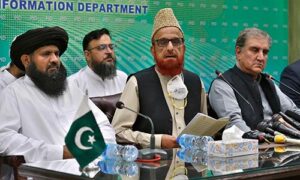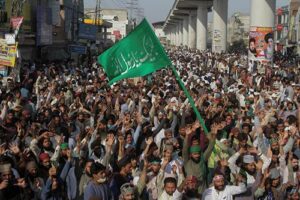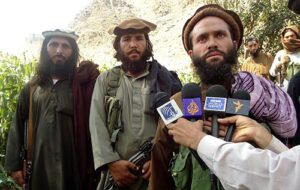Pakistan’s civil and military leadership appears to once again be in a mood to forget, forgive and move on — at least in a select number of cases. This time around, the beneficiaries of the government and state institutions’ largesse are those who, not long ago, were dubbed as “extremists, RAW-sponsored, terrorists,” or at best the “fringe element.”
But all of a sudden they are apparently no longer considered the enemy of the people. Pragmatism has won, yet again. On the one hand the banned Tehreek-e-Labbaik Pakistan (TLP) has been mainstreamed, on the other, Prime Minister Imran Khan has disclosed that peace talks are underway with another outlawed and the most-dreaded group, the Tehreek-e-Taliban Pakistan (TTP).
If the TLP has won notoriety through frequent violent protests — the most recent ones in October in which half-a-dozen policemen were practically lynched by the mob, and more than 500 others severely beaten up and injured — the TTP has been waging a war against the state and the people of Pakistan for nearly two decades now, killing and wounding thousands of civilians, including children, and security personnel.
Yet, the TLP and the TTP, despite both being hardline Sunni conservative religious organisations, stand poles apart in their vision, politics, strategy and lethality.

The TLP, founded in August 2015, is an ultra-orthodox, overwhelmingly intolerant and violent religious-political group representing the Barelvi school of thought — once considered moderate and flexible.
Compared to the outlawed TTP, which comprises followers of the Deobandi school of thought, the TLP’s core ideological agenda remains narrow, revolving around the “finality” of Prophet Muhammad (PBUH) — one of the core beliefs of all Muslims across the world — and the protection of Pakistan’s blasphemy laws. In the past, the Barelvi school of thought, which is held by the majority of Pakistan’s Muslims, was represented by religious-political parties like the Jamiat Ulema-e-Pakistan (JUP) of Maulana Shah Ahmad Noorani and its rival factions.
However, the old breed of Barelvi leaders were nothing like that of the late Maulana Khadim Hussain Rizvi, the founder of the TLP, who shot to prominence because of his hardline stance on various issues, including opposing the death penalty given to Mumtaz Qadri — the police guard who assassinated Governor Punjab Salman Taseer in 2011 — and the use of aggressive and foul language in his speeches. After Rizvi’s demise in November 2020, his son Saad Hussain Rizvi took over the party. As expected, he followed in his father’s footsteps and was arrested for inciting violent protests on April 12, 2021. Two days later the party was banned, but the government’s crackdown did not diminish TLP’s influence nor prevent it from carrying out assorted questionable activities.
The government’s inability to stop the TLP activities despite the ban remains understandable. The group emerged as the fifth largest party in the country and the third largest in the Punjab province in the 2018 general elections, securing more than 2.2 million votes. Its support base largely comprises the socially conservative people belonging to lower-income groups, the majority of whom have been deprived of even basic schooling, let alone modern education, and proper jobs.
The TLP’s demand to expel the French ambassador to Pakistan was once the main and non-negotiable demand of the group as it took to the streets multiple times to protest against the publication of cartoons or caricatures of Islam’s Prophet (PBUH) in France.
But just as the government suddenly showed flexibility toward the group, the mediators representing the TLP too changed their stance to end the face-off with the authorities, saying that the exile of the French ambassador was never their demand. They now maintain the TLP only wanted the matter to be discussed in Parliament.
The mutual climbdown by both sides from their extreme positions averted a potentially ugly and dangerous situation. The TLP leaders went back home promising not to stage such violent protests in the future, and at the same time dropping the contentious demand regarding the removal of the French ambassador. In return, the TLP was removed from the list of proscribed organisations, and hundreds of its workers and leaders, including Saad Hussain Rizvi, freed, as the government dropped cases against them.

While the government’s detractors are branding this deal as “surrender and capitulation before the TLP,” there are many who say that the ruling party did the right thing by managing to end the protests through talks. According to them, a crackdown on protesters was not an option as it could have resulted in a bloodbath, creating a destabilising factor for the entire country. This position is also shared by the country’s mighty military establishment as the Army Chief General Qamar Javed Bajwa also played a role in cooling down temperatures and preventing the showdown, even though some cabinet members clearly favoured using strong-arm tactics against the protesters.
According to one negotiator, despite their original respective hardline positions, neither the government nor the TLP leadership wanted matters to go out of control. “The good thing is that at the end common sense prevailed. The deal proved a win-win for both sides,” said one of the negotiators.
Mufti Muneeb-ur Rehman, philanthropist Maulana Bashir Farooqi and prominent businessman Aqeel Karim Dhedhi played a key role in bringing down the temperature and brokering a deal as they met the Army Chief, Prime Minister Imran Khan, hosts of other important government functionaries and the TLP leaders, who collectively authorised them to come up with a solution.
Interestingly, the major opposition parties, including the Pakistan Muslim League-Nawaz (PML-N), refrained from criticising the government-TLP deal. Only the country’s English-language press, dominated by liberal voices and a tiny segment of activists and NGOs, remained in the forefront in slamming the government over its agreement with the TTP. Yet, these critics did not come up with any alternate plan to address the question of what the government should have done to remove the several thousand workers of the TLP from the roads without any bloodshed.
A security official said that “on how many fronts can any state or government fight at the same time?” He added “Religion is deep-rooted in Pakistan and emotions run high on religious issues. The more one tries to suppress these issues, the more strongly and violently they will come back to create problems. Therefore, give and take was the only option.”
This notwithstanding, the TLP issue highlighted the fissures within the ruling Pakistan Tehreek-e-Insaaf (PTI) camp. Cabinet members, led by Prime Minister Imran Khan, were clearly not all on the same page on how to tackle the TLP.
If Information Minister Fawad Hussain Chaudhry and a couple of others were looking for a crackdown, there were others who wanted a more restrained approach. Eventually, the PTI hardliners were forced to eat dust in the final negotiations with the TLP and its facilitators, with the doves squarely in the forefront.
Now, many within the PTI are hoping to reach some kind of adjustment and understanding with the TLP in the next general elections, which was why the PML-N, looking to benefit from the same political strategy, had refrained from taking a strong position against the religious group and its deal with the government.
“Now if the PTI plays its card well, the deal with the TLP can yield some solid electoral and political dividends for it,” said a security official monitoring the situation.
However, the general impression in the public remains that it was the military leadership which nudged the two sides to reach a peaceful solution.
Critics say that the principles and the writ of the state have again been sacrificed at the altar of the pragmatism of day-to-day politics, which will have a long-term negative fallout for Pakistani society and the state.
One lesson, many disgruntled, hardline and even fringe groups will inevitably draw from such a deal is that the use of street power, violence and might is the most effective way to get their demands approved from those in power — even if the law and the constitution have to be bent to accommodate them.
Another negative fallout of the deal is that it has further constricted the already increasingly tight space for rational discourse and law-based governance in the country. While Islam remains the bedrock of the state of Pakistan, its ultra-conservative and intolerant interpretations are damaging and encourage other religious groups to adopt the TLP’s course of action. Going forward, if Pakistan is to survive and succeed, the government and state institutions with the help of reasonable ulema and clerics should endeavour to ensure that the country’s religious parties operate only under the legal and constitutional framework, with zero tolerance towards any transgression.
The TTP affair is an altogether different ballgame, having far-reaching pros and cons compared to the government’s deal with the TLP.
Unlike the TLP’s narrow agenda, the TTP has continued to challenge the very writ and constitution of the state, and remained involved in terrible acts of violence and terrorism against the civilian population as well as against security forces. Giving a clean chit to its leaders and militants as has been given to the TLP will have far graver consequences and could result in a dire backlash. Therefore, even if the Prime Minister wants an agreement with the TTP, it won’t be easy to clinch it for a host of factors.
Firstly, if the past is any guide, peace agreements with the TTP and its likes have always collapsed as the insurgents used these deals to create space for themselves and eventually dominate the civilian population in the areas where they operate, flagrantly challenging the writ of the state. How any government would be able to guarantee that this does not happen, remains the most pressing question.
Secondly, insiders say that Prime Minister Imran Khan has spoken about peace talks way too prematurely, when even their framework has not been chalked out. Intelligence agencies and security forces often remain in touch with militants as a matter of routine and not every engagement can be described as a “formal talk,” aimed at conflict resolution.
Thirdly, the TTP is not a monolithic force. And so, there remains the question of who is talking to whom and whether those in contact are also effective on the ground. Equally important are the terms and framework of the negotiations, which have not been disclosed if these talks are a serious bid to broker peace.
Security officials describe this initiative as dicey and dangerous. “We have yet to see how far this process has already gone and how far it could go,” said another official.
Meanwhile, the Afghan Taliban are also pressing for negotiations for two reasons; one, they want to use these as a bargaining chip with Pakistan, and the other broader motive is that they do not want to see the TTP joining hands with the Daesh.

“The TTP is a strategic weapon for so many competing forces in the region, and Pakistan must tread carefully, keeping its mid-to-long-term interests in sight,” said the intelligence official.
After the Afghan Taliban takeover of Kabul, Pakistan is in a relative position of strength vis a vis tackling the challenge of terrorism. With RAW and the NDS — the former Afghan intelligence agency — no longer in hostile action on the country’s western frontiers, Pakistan can also leverage the Afghan Taliban’s influence in their favour, without conceding any grounds to the TTP.
In the past and in a much more difficult position, Pakistan single-handedly turned the tide of terrorism and ousted the militants from its territory.
In any engagement with the TTP, Prime Minister Imran Khan and his team must ensure that the hard-won gains made on the ground through sweat, blood and enormous sacrifices, do not get reversed.
The government should not just think about the international consequences of its engagement with the Taliban, but also the internal dynamics, where other proscribed groups and their silent and active supporters will also be watching to see how far they can push the ir respective agendas and get similar treatment.
The most deserving of these groups perhaps remains Hafiz Saeed’s Jamaatud Dawa, which was never involved in any terrorist or militant activity in Pakistan. In fact, it won the hearts of many through relief and social work — from helping the affected people of the 2005 earthquake, to the host of victims of other natural disasters. The group and its leadership are being punished only because of foreign pressure to appease India. Their crime remains speaking for the rights of the people of Occupied Kashmir.
And then, in an ironic twist of affairs, demands for the mainstreaming of militants are being made by the Muttahida Qaumi Movement, the Pak-Sarzameen Party and others.
Indeed, striking a deal with the TTP would open a Pandora’s Box for the government, which will have far reaching negative repercussions for the country both nationally and internationally. The government must tread this minefield carefully.

The writer is a senior journalist and managing editor, Narratives.



